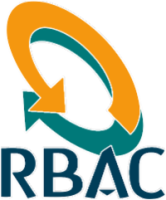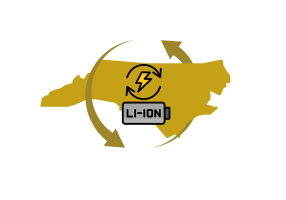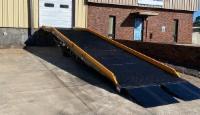Fall 2025
Subscribe to Recycling Works | Pricing Trends | Past RBAC Newsletters |
We Want to Hear from You!: Do you have business news, upcoming events, or activities to share? Let us help spread the word! Reach out to Emily Weaver at Emily.Weaver@deq.nc.gov with your updates!
In this issue:
• Grant Applications for 2026 Funding Cycles Open
• Upcoming Lithium-Ion Battery Meeting November 5th
• Grantee Spotlight: ADEL Recycling Inc. Expands Operations and Boosts Recovery
• Building Back After Helene: 25 Million to Strengthen Recycling Infrastructure
• Recycling in North Carolina: Strong, Adaptive, Moving Forward
• 2025 ESI Conference Recap: Connecting Through Environmental Stewardship
• Professional Development Opportunities
Grant Applications for 2026 Funding Cycles Now Open

Recycling Business Development Grant: The N.C. Recycling Business Assistance Center (RBAC) seeks viable, well-planned proposals from recycling businesses in North Carolina that build lasting, private-sector capacity to divert materials from the waste stream, promote the circular economy, and create jobs in North Carolina. Projects are eligible to apply for up to $75,000.
- Proposals are due by 5pm on Thursday, Nov. 20, 2025.
- Click here to access RBDG Application Materials
- For questions, please contact: Emily Weaver at 919-707-8913 or Emily.Weaver@deq.nc.gov | Sandy Skolochenko at 919-707-8147 or Sandy.Skolochenko@deq.nc.gov
Food Waste Reduction Grant: Local governments, nonprofits, and recycling businesses are invited to apply for a grant that supports the recovery of wasted food through the expansion of food donation networks and organics recycling operations, including collection and hauling. Projects are eligible to apply for up to $40,000. Projects that involve edible food recovery and expanding organics recycling infrastructure are eligible for Priority Level funding of up to $60,000.
- Proposals are due by 5pm on Friday, Oct. 24, 2025
- Click here to access RWRG Application Materials
- For questions, please contact: Christine Wittmeier at 919-707-8121 or Christine.Wittmeier@deq.nc.gov | Sandy Skolochenko at 919-707-8147 or Sandy.Skolochenko@deq.nc.gov
Community Waste Reduction and Recycling Grant: North Carolina local governments may now apply for grant funding to build lasting capacity to divert materials from the waste stream and/or increase public awareness of recycling. Local governments may apply for up to $50,000 for priority projects and up to $40,000 for standard projects.
Businesses are encouraged to partner with local governments on recycling and waste reduction projects. Collaborations can help expand collection services, improve processing infrastructure, and strengthen grant applications which can create lasting benefits for both the community and local industry. Please share this opportunity with local partners who may be interested in collaborating.
- Proposals are due by 5pm on Friday, Feb. 13, 2026
- Click here to access CWRAR application materials
- For questions, please contact: Alex Miller at 919-707-8190 or Alex.Miller@deq.nc.gov | Sandy Skolochenko at 919-707-8147 or Sandy.Skolochenko@deq.nc.gov
Upcoming Lithium-Ion Battery Meeting on November 5th

The NC Department of Environmental Quality’s (NCDEQ) recycling office is hosting a battery recycling meeting with private recycling sector stakeholders on November 5. This meeting is an opportunity to learn about the upcoming lithium-ion battery landfill ban that goes into effect on December 1, 2026 and share your input on the statewide outreach program and support resources that will be developed.
Topics will include:
- Local government recycling programs and operations;
- Fire safety at recycling facilities
- Education needed to encourage proper battery management.
The meeting will be held at DEQ’s headquarters from 1:30 to 3:00 p.m. on November 5, 2025. There will be a virtual option made available for those not able to attend in person.
If you are interested in attending either virtually or in person, contact Matt James at Matt.James@deq.nc.gov.
Grantee Spotlight: ADEL Recycling LLC Expands Operations and Boosts Plastic Recovery

ADEL Recycling LLC of Statesville received a 2025 Recycling Business Development grant from NCDEQ to increase the amount of plastic diverted from landfills and enhance the company’s material handling. In addition, the project allowed ADEL to create four new full-time jobs, adding to their already strong workforce of six employees.
Established in 2021, ADEL Recycling processes nonwoven post-industrial polypropylene (PP) scrap to produce recycled PP pellets designed to meet critical manufacturing specifications. With this project, ADEL continued to expand its business model to include polystyrene (PS) regrind, broadening the range of materials recovered and reused in manufacturing.
Through the grant, ADEL acquired a forklift, ramp, and dry van trailer, enabling it to handle both PP and PS materials at a much larger scale. These improvements complement a state-of-the-art polystyrene processing system purchased outside of the grant, expanding recycling capacity to more than 2,100 metric tons (4.7 million pounds) of plastic each year.
During implementation, ADEL found that their original location in Mooresville could no longer meet power demands and was able to successfully relocate to a larger facility in Statesville with minimal operational disruption. The move ultimately improved operational efficiency and scalability while supporting the local economy through new job creation and new 24/7 operations.
Through innovation and partnership, ADEL Recycling continues to show how strategic investments in recycling infrastructure can create local jobs, stronger operations, and measurable environmental benefits. The Recycling Business Development Grant, administered by the NCDEQ’s Recycling Business Assistance Center, helps North Carolina companies expand capacity, create jobs, and keep valuable materials in circulation. Businesses are encouraged to apply for the currently open grant cycle.
Building Back After Helene: $25 Million to Strengthen Public Recycling Infrastructure in Western North Carolina
A little over one year after the devastation of Hurricane Helene, Western North Carolina continues to show resilience. Businesses are reopening, tourism is returning, and communities are steadily rebuilding. Now, a federal funding boost will help that progress continue, especially when it comes to recycling and materials recovery.
The North Carolina Department of Environmental Quality (DEQ) recently received $25 million in supplemental funding from the U.S. Environmental Protection Agency (EPA) to provide grants to local governments in western North Carolina to improve recycling infrastructure impacted by Hurricane Helene. The grant opportunity is part of a larger $61 million DEQ grant from EPA that also includes funding to assist with debris cleanup, pesticide removal, and brownfields redevelopment.
“Recovering from Hurricane Helene is a long-term process,” said Gov. Josh Stein. “It’s critical we not only clean up the pollution but also build our infrastructure back stronger.”
The recycling infrastructure investment is especially significant as these funds will help rebuild and modernize local recycling systems in the affected areas, expand processing capacity, and strengthen the local supply chains that keep valuable materials circulating throughout the entirety of North Carolina’s circular economy.
“These grant funds will be instrumental in further assisting Helene-impacted communities,” said Michael Scott, Director of DEQ’s Division of Waste Management. “We can make transformational improvements to western North Carolina’s recycling infrastructure, reducing reliance on landfills and redirecting valuable materials back into the local economy.”
The Helene Recovery Recycling Infrastructure Grant launched this week, providing $25 million for eligible local governments in 39 Helene-impacted counties to improve their recycling and composting infrastructure. While these funds are only available to local governments, they can utilize the funds to replace damaged equipment, enhance collection efficiency, and build more resilient systems that will better withstand future storms.
It is important to note that these municipal investments open doors for recycling businesses. As communities rebuild, there will be opportunities for businesses to partner with local governments on projects that increase material recovery, expand processing capabilities, and improve the flow of recycled feedstock to manufacturers.
As DEQ implements these programs, the Recycling Business Assistance Center (RBAC) will continue supporting both public and private partners through technical assistance, grant opportunities, and market development resources, helping ensure that the benefits of this investment reach every corner of the recycling sector.
Please visit the webpage to learn more about the Helene Recovery Recycling Infrastructure Grant.
Read more about this award here.
Recycling in North Carolina: Strong, Adaptive, & Moving Forward

Change has certainly been in the air within North Carolina’s circular economy. From name changes to buyouts, facility transfers, and a few closures, the past months have brought visible shifts. But what do these changes really mean?
The circular economy often mirrors broader market swings. With national and global pressures at play, pricing adjustments in recycling and post-consumer goods are natural and can often act as signals of realignment and resilience, not retreat.
Over the past year, NC has experienced several notable transitions:
• Curbside Management acquired Sonoco’s Candler facility, reinforcing local processing capacity.
• Foothills Waste Solutions’ assets were acquired by Meridian Waste, expanding hauling reach.
• Wallace Farm joined Denali, linking local composting know-how with a national platform.
• Wall Recycling rebranded as Liberty Waste Solutions, reflecting modernization and expansion.
• SPR (Solarpanelrecycling.com, a subsidiary of Powerhouse Recycling) is adding a 50,000 sq. ft processing plant to enhance its NC Solar Panel Recycling capabilities.
• Clear Path Recycling ceased operations in Fayetteville earlier this year, yet, parallel to that, Polykemi in Gastonia (a plastic compounding facility that uses both virgin and post-consumer material) recently announced a capacity increase by 2027 to meet growing U.S. demand.
Even where ownership or branding changes, the infrastructure, expertise, and ecosystem remain active components of North Carolina’s recycling system. The Recycling Business Assistance Center also continues to track and share up-to-date market trends to help support informed decision-making and business development across the sector.
Ultimately, change can fuel growth. The state’s recycling sector continues to demonstrate flexibility, innovation, and a deep commitment to circularity. The Recycling Business Assistance Center remains poised to foster that momentum through technical support and grant investment (see above notice of RFP).
2025 ESI Conference Recap: Connecting Through Environmental Stewardship
The N.C. Department of Environmental Quality’s Division of Environmental Assistance and Customer Service hosted the annual Environmental Stewardship Initiative (ESI) Conference on October 9–10 at the McKimmon Center in Raleigh.
This year’s theme, Connecting Through Environmental Stewardship, brought together industry leaders, government representatives, and sustainability professionals to share innovative strategies for reducing waste, improving efficiency, and strengthening North Carolina’s circular economy.
Sessions featured Pfizer, Egger Wood Products, and others, covering topics from energy balance and environmental project implementation to navigating recycling markets and wood-waste circularity. Attendees also engaged in networking sessions, a waste diversion roundtable led by DEACS staff, and a DEQ regulatory panel highlighting cross-division collaboration.
ESI is a free, voluntary program designed to recognize and support organizations that go above and beyond to reduce their impact on the environment. Participants gain access to technical assistance at no-cost and are connected to a network of peers, with ample opportunities to share solutions and celebrate successes as they achieve their goals.
Interested in becoming a member? Learn more about ESI membership and impact on the DEQ’s Partner Programs site.
|
|
|
|
